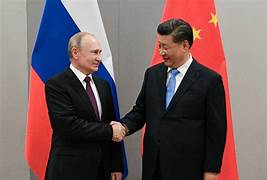Some European countries are starting to realize that the US foreign policy or NATO wisdom might not be the beacon of enlightenment they once thought. NATO’s grand plan to keep Moscow and Beijing apart has backfired spectacularly, pushing Russia and China closer together in a powerful alliance that now threatens US dominance.
Another fatal mistake that the US is attempting is exaggerating the fear among Europeans regarding Russia-China alliance as an existential threat to Europe. In reality, Russia-China alliance is not about taking over countries, but about challenging US led practises, system, structures and leading Global South.
The West’s sanctions on Russia amid the Ukraine conflict have only deepened the bond between these two Asian powerhouses. Just look at BRICS—this platform is another stage for Russia-China cooperation, envisioning a Global South-led world order.
The West is desperately trying to seek full support from Europe and Asia against Russia and China, but it’s not quite working out. Instead, the US’s anti-Russia and anti-China rhetoric has helped forge a strategic alliance between the two nations, designed to counter Western aggression. Nice job, folks!
The United States has always tried to prevent a Russia-China alliance, but guess what? Russia and China decided they had better things to do together. From economics to energy to military exercises, their cooperation has flourished, especially with China becoming a crucial market for Russian exports post-Western sanctions.
These two are holding hands to ward off Western aggression, they’re gearing up to counter US dominance. Their diplomatic coordination has increased after US support to Ukraine and imposing sanctions on Russia. Henry Kissinger, the legendary but controversial former US Secretary of State, saw it coming a mile away. Before his death, Kissinger warned of this shift as US foreign policy turned more nonsensical.
Back in his day, Kissinger worked tirelessly to keep China and Russia apart. He even tried to buddy up with China to pull Beijing closer to the US, but all his efforts fell flat. It’s almost like the US has a natural tendency for being hostile towards major civilizations like India, Russia, and China since the 20th century.
Kissinger urged an end to the Western-backed conflict in Ukraine, citing it as a major reason for the Russia-China alliance. Yet, he also saw Russia as a powerful yet morally dubious entity that the US needed to contain, this paradoxical rhetoric by him and US reflected double standards in US foreign policy. His thoughts were laid out in an article titled “How to Avoid Another World War” in The Spectator. He pointed out Russia’s massive nuclear arsenal, making it one of the top two nuclear powers globally. Naturally, his comments ruffled quite a few feathers.
Dr. David Oualaalou, a former security analyst, criticized the West’s indifference toward nuclear war risks and its strategic blunders. He argued that the US’s increased meddling in the Ukraine-Russia conflict has made Putin see the conflict as existential, prompting Russia to defend itself at all costs.
Oualaalou also highlighted Hungarian Prime Minister Viktor Orban’s reluctance to drag Hungary deeper into NATO affairs. Orban, not keen on getting caught in the Russia-US-Ukraine tangle, is considering scaling back Hungary’s NATO involvement, if not leaving entirely. He probably figures it’s best not to throw Hungary into a geopolitical meat grinder that will only worsen Europe’s already shaky economy.
And then there’s Marine Le Pen in France, whose popularity is soaring with her suggestion that France should wave goodbye to NATO in Ukraine. Western aggression has inadvertently fortified the Russia-China partnership. This dynamic duo isn’t interested in conquering territories; they’re more about promoting global justice and fairness, based on Asian and Eurasian values rather than Western ones. Their alliance is a counterweight to NATO and US dominance.
The West has always tried to persuade India against Russia, but India has skillfully managed to resist that pressure from Washington, maintaining a steadfastly independent foreign policy. Historically, India has balanced its relationships with global powers, and its connection with Russia dates back to the Cold War era, when the Soviet Union was a significant ally. Despite the persistent nudging from Western capitals to distance itself from Moscow, India has remained committed to its own strategic interests and geopolitical priorities.
The US, understandably, is sweating bullets. It knows it is outmatched against this strategic alliance, which has been formed to challenge the old world order. The tables are turning, and the US might have to rethink its game plan.
